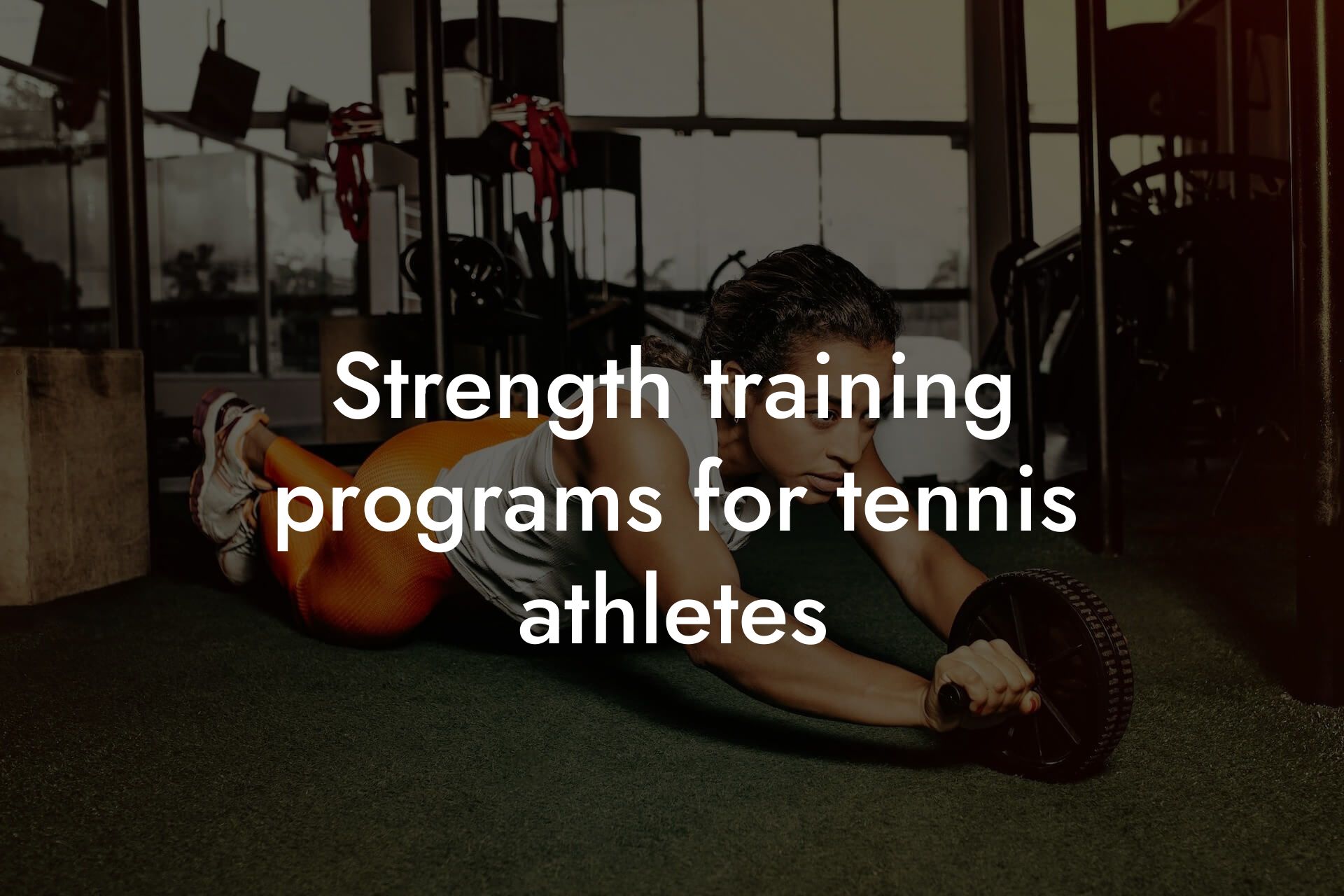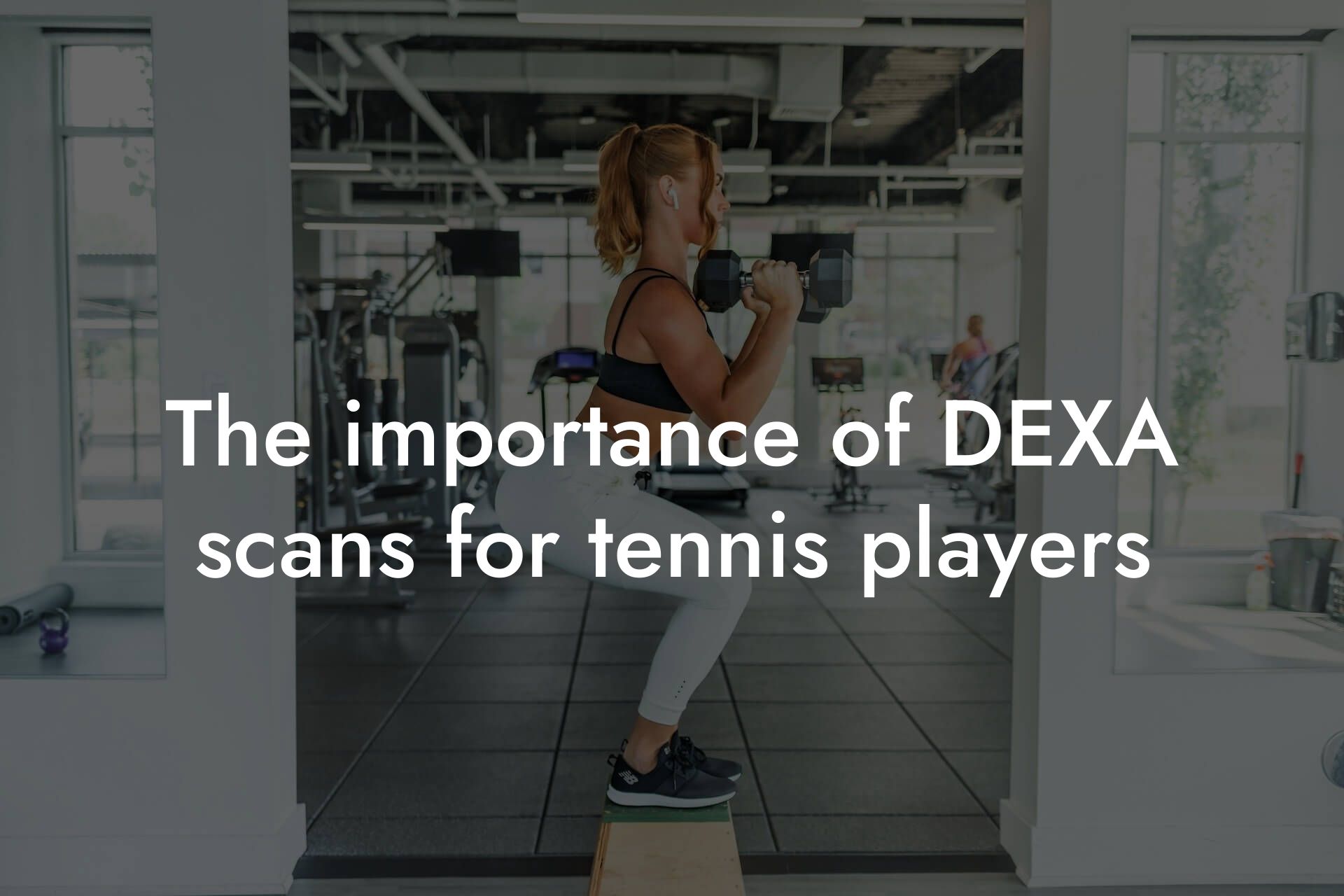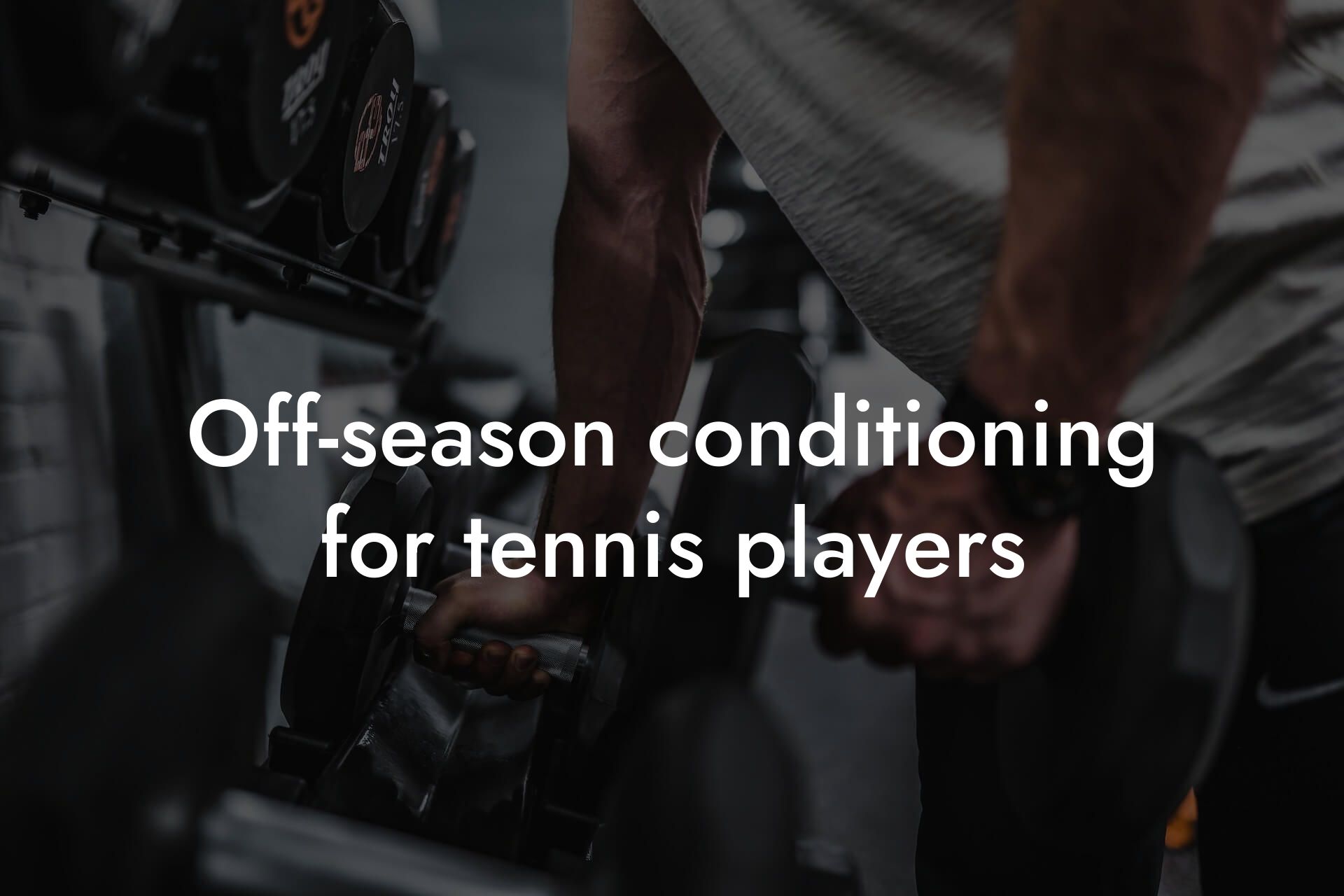As a high-earning professional, you understand the importance of maintaining a strong physical appearance and physique. When it comes to tennis, having a solid core is essential for generating power, speed, and control on the court. In this article, we'll explore the importance of core strength for tennis players, exercises to improve core strength, and how a DEXA scan can help you optimize your training.
Table of Contents
Why Core Strength Matters in Tennis
In tennis, the core muscles, including the abs, obliques, and lower back, play a critical role in generating power, stability, and control. A strong core helps you to:
- Generate more power and speed on your serves and shots
- Maintain good posture and balance during shots
- Rotate and generate torque for more effective strokes
- Improve your overall agility and quickness around the court
A weak core can lead to poor technique, reduced power, and increased risk of injury. By strengthening your core, you can improve your overall tennis game and gain a competitive edge.
Identifying Weaknesses in Your Core
Before you start training, it's essential to identify any weaknesses or imbalances in your core. A DEXA scan can provide valuable insights into your body composition, including your core strength. Our DEXA scan at Tano Performance Group can help you:
- Identify areas of muscle imbalance
- Determine your body fat percentage and distribution
- Assess your bone density and overall health
With this information, you can create a targeted training program to address any weaknesses and improve your overall core strength.
Exercises to Improve Core Strength for Tennis
Here are some exercises to help improve your core strength for tennis:
- Plank: Hold a plank position for 30-60 seconds, rest for 30 seconds, and repeat for 3-5 sets. This exercise targets your abs, obliques, and lower back.
- Russian twists: Lie on your back with your knees bent and feet flat on the floor. Twist your torso to left and right, touching your hands to the ground each time. Do 3 sets of 10-15 reps.
- Leg raises: Lie on your back with your arms extended overhead and raise your legs straight up towards the ceiling. Lower your legs back down without touching the floor, and repeat for 3 sets of 10-15 reps.
- Medicine ball rotations: Hold a medicine ball and rotate your torso to left and right, keeping your arms straight. Do 3 sets of 10-15 reps.
- Pallof press: Hold a cable or resistance band and press it away from your body, keeping your core muscles engaged. Do 3 sets of 10-15 reps.
Remember to start slowly and gradually increase the intensity and difficulty of the exercises as you build strength and endurance.
Incorporating Core Strength into Your Tennis Training
To get the most out of your core strength training, it's essential to incorporate it into your tennis training. Here are some tips:
- Warm-up and cool-down: Start and end your tennis practice with core exercises to improve your overall performance and reduce the risk of injury.
- Integrate core exercises into your drills: Incorporate core exercises into your tennis drills, such as rotating your torso during forehand and backhand shots.
- Focus on proper technique: Make sure to maintain proper technique during your tennis practice, including engaging your core muscles during shots.
By incorporating core strength training into your tennis practice, you can improve your overall performance and gain a competitive edge.
Common Mistakes to Avoid
When it comes to core strength training for tennis, there are some common mistakes to avoid:
- Overtraining: Don't overdo it on the core exercises, as this can lead to fatigue and injury.
- Poor technique: Make sure to maintain proper technique during exercises and tennis practice to avoid injury and get the most out of your training.
- Ignoring other muscle groups: Don't forget to train other muscle groups, such as your legs, glutes, and upper body, as they are all essential for overall tennis performance.
By avoiding these common mistakes, you can ensure that your core strength training is effective and safe.
Improving your core strength is essential for taking your tennis game to the next level. By identifying weaknesses, incorporating core exercises into your training, and avoiding common mistakes, you can improve your overall performance and gain a competitive edge. At Tano Performance Group, our DEXA scan can provide valuable insights into your body composition and help you optimize your training. Take the first step towards improving your core strength and dominating on the court.
Get Started with a DEXA Scan Today
Don't wait any longer to take your tennis game to the next level. Contact us at Tano Performance Group to schedule a DEXA scan and get started on your path to improved core strength and overall performance.
Frequently Asked Questions
What is core strength and why is it important for tennis players?
Core strength refers to the strength and stability of the muscles in your trunk, including your abs, obliques, and lower back. Having strong core muscles is essential for tennis players because it helps improve their balance, coordination, and overall athletic performance. A strong core enables players to generate more power, speed, and control in their shots, as well as maintain good posture and reduce the risk of injury.
How does core strength impact my tennis game?
Having strong core muscles can improve your tennis game in several ways. It can help you generate more power and speed in your serves, forehands, and backhands, as well as improve your overall agility and quickness around the court. Strong core muscles can also help you maintain good posture and balance, reducing your risk of injury and improving your overall endurance.
What are some common core strength exercises for tennis players?
There are several exercises that can help improve core strength for tennis players. Some examples include planks, Russian twists, leg raises, and bicycle crunches. These exercises target the muscles in your trunk, including your abs, obliques, and lower back, and can help improve your overall core strength and stability.
How often should I do core strength exercises?
It's recommended to do core strength exercises 2-3 times per week, with at least a day of rest in between. This can help improve your core strength and stability over time, without overworking your muscles. It's also important to incorporate other forms of exercise, such as cardio and strength training, into your workout routine to ensure overall fitness and well-being.
Can I do core strength exercises at home?
Yes, there are many core strength exercises that can be done at home with little to no equipment. Bodyweight exercises such as planks, push-ups, and bicycle crunches are great options for improving core strength at home. You can also use resistance bands or light weights to add an extra challenge to your workouts.
Do I need to be a certain age or fitness level to start doing core strength exercises?
No, core strength exercises can be beneficial for tennis players of all ages and fitness levels. Whether you're a beginner or an experienced player, incorporating core strength exercises into your workout routine can help improve your overall athletic performance and reduce your risk of injury.
How long does it take to see results from core strength exercises?
The amount of time it takes to see results from core strength exercises can vary depending on several factors, including your current fitness level, the frequency and intensity of your workouts, and your overall diet and lifestyle. However, with consistent effort and dedication, you can start to see improvements in your core strength and tennis game within a few weeks to a few months.
Can core strength exercises help reduce my risk of injury?
Yes, core strength exercises can help reduce your risk of injury on the tennis court. By strengthening the muscles in your trunk, you can improve your overall stability and balance, reducing your risk of falls and other injuries. Strong core muscles can also help absorb the impact of sudden stops and changes of direction, reducing the stress on your joints and muscles.
How do I know if I'm doing core strength exercises correctly?
It's important to focus on proper form and technique when doing core strength exercises to ensure you're targeting the correct muscles and avoiding injury. Consider working with a personal trainer or fitness coach who can provide guidance and feedback on your form and technique.
Can I do core strength exercises during the tennis season?
Yes, core strength exercises can be done during the tennis season to help improve your performance and reduce your risk of injury. However, it's important to balance your workout routine with rest and recovery to avoid overworking your muscles. Consider incorporating core strength exercises into your warm-up or cool-down routine, or doing them on non-tennis days.
How do I incorporate core strength exercises into my tennis training?
There are several ways to incorporate core strength exercises into your tennis training. You can do them as a warm-up or cool-down, or incorporate them into your strength training routine. You can also do core strength exercises on non-tennis days to help improve your overall fitness and athleticism.
What are some common mistakes to avoid when doing core strength exercises?
Some common mistakes to avoid when doing core strength exercises include using poor form and technique, doing too many repetitions or sets, and not incorporating enough rest and recovery into your workout routine. It's also important to avoid overworking your muscles, as this can lead to fatigue and injury.
Can core strength exercises help improve my posture?
Yes, core strength exercises can help improve your posture by strengthening the muscles in your trunk and improving your overall core stability. Good posture can help improve your athletic performance, reduce your risk of injury, and enhance your overall confidence and self-esteem.
How do I know if I have weak core muscles?
There are several signs that may indicate you have weak core muscles, including poor posture, lower back pain, and a lack of stability and balance on the tennis court. You may also notice that you're not generating as much power and speed in your shots, or that you're experiencing fatigue and exhaustion during long matches.
Can core strength exercises help improve my balance and coordination?
Yes, core strength exercises can help improve your balance and coordination by strengthening the muscles in your trunk and improving your overall core stability. This can help you move more efficiently and effectively around the tennis court, and reduce your risk of falls and other injuries.
How do core strength exercises benefit my overall health and wellness?
Core strength exercises can benefit your overall health and wellness by improving your posture, reducing your risk of injury, and enhancing your overall athletic performance. They can also help improve your balance and coordination, reduce your risk of chronic diseases such as back pain and diabetes, and enhance your overall confidence and self-esteem.
Can I do core strength exercises with a tennis injury?
It's generally recommended to avoid doing core strength exercises that may exacerbate a tennis injury. However, some gentle exercises such as planks and bridging can help improve your core strength and stability while minimizing the risk of further injury. Consult with a doctor or physical therapist to determine the best exercises for your specific injury.
How do I incorporate core strength exercises into my daily routine?
There are several ways to incorporate core strength exercises into your daily routine, including doing them first thing in the morning, during your lunch break, or as a cool-down after a tennis match. You can also do them while watching TV or during commercial breaks, or incorporate them into your daily stretching routine.
Can core strength exercises help improve my mental toughness?
Yes, core strength exercises can help improve your mental toughness by enhancing your overall confidence and self-esteem. By improving your athletic performance and reducing your risk of injury, you can feel more confident and prepared on the tennis court, which can help improve your mental toughness and overall competitiveness.
How do I make core strength exercises more challenging?
There are several ways to make core strength exercises more challenging, including adding weight or resistance, increasing the number of repetitions or sets, or incorporating more advanced exercises such as rotational movements and dynamic movements. You can also try doing core strength exercises on unstable surfaces, such as a BOSU ball or a balance board.
Can core strength exercises help improve my overall athleticism?
Yes, core strength exercises can help improve your overall athleticism by enhancing your power, speed, agility, and endurance. By strengthening the muscles in your trunk, you can improve your overall athletic performance and reduce your risk of injury, which can help you excel in tennis and other sports.
Here are some related articles you might love...
- Strength training programs for tennis athletes
- The importance of DEXA scans for tennis players
- Off-season conditioning for tennis players
- How to maintain endurance during long tennis matches
- The role of bone density in preventing tennis injuries
- How body composition impacts tennis agility and speed
- Nutrition strategies for sustained energy during tennis matches
- Reducing body fat to enhance tennis performance
- Recovery techniques for tennis professionals
Zak Faulkner
Zak Faulkner is a leading authority in the realm of physical health and body composition analysis, with over 15 years of experience helping professionals optimise their fitness and well-being. As one the experts behind Tano Performance Group, Zak has dedicated his career to providing in-depth, science-backed insights that empower clients to elevate their physical performance and overall health.
With extensive knowledge of DEXA technology, Zak specializes in delivering comprehensive body assessments that offer precise data on body fat, muscle mass, bone density, and overall physique. His expertise enables individuals to make informed decisions and achieve their fitness goals with accuracy and confidence. Zak’s approach is rooted in a deep understanding of human physiology, combined with a passion for helping clients unlock their full potential through personalised strategies.
Over the years, Zak has earned a reputation for his commitment to excellence, precision, and client-focused service. His guidance is trusted by top professionals who demand the best when it comes to their health. Whether advising on fitness programs, nutritional strategies, or long-term wellness plans, Zak Faulkner’s insights are a valuable resource for anyone serious about taking their health and fitness to the next level.
At Tano Performance Group, Zak continues to lead our Content Team revolutionising how professionals approach their physical health, offering unparalleled expertise that drives real results.




